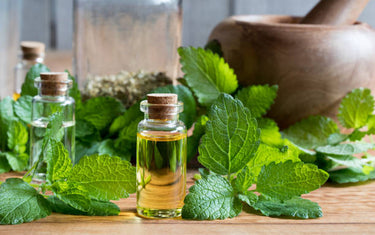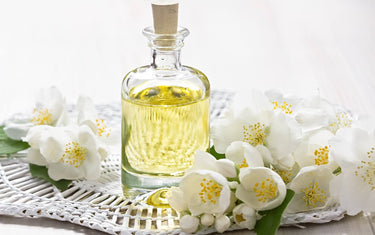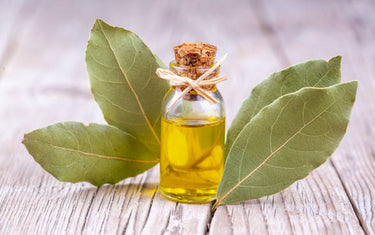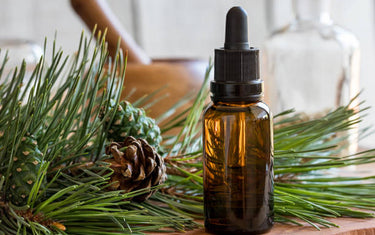9 min read / 4 December 2023 / yasmin sharp
10 Benefits and Uses of Cypress Oil
Healing cypress has ties to immortality and can relieve pain and cough symptoms.
Share this post

The scent of cypress oil evokes feelings of walking through a fresh pine forest, helping to create a strong connection with nature.
Cypress essential oil has strong symbolic connections to spirituality and was first used in medicine by the Mediterranean Etruscan tribes between the 8th and 3rd century BCE.
It has gone on to establish itself as a prominent oil used for massages and mediation, with cypress oil benefits now being enjoyed by people from all over the world.
From easing muscle pains to soothing wounds, we examine what cypress oil has to offer and how it could benefit you on a day-to-day basis.
What is cypress oil?Cypress essential oil is extracted via steam distillation from the leaves and needles of the Mediterranean cypress tree, which is also known by its botanical name, Cupressus Sempervirens. The oil has a distinctly aromatic aroma that smells fresh and energising, with a slight hint of sweetness mixed into its natural tones. It is sometimes used in some men’s fragrances, as it is said to be reminiscent of other pine essential oils, as well as juniper berry oil. And because the oil has a long-standing connection with spirituality, it is often used in meditation to clear and ease the mind, and is also believed to improve concentration levels. |
How does cypress oil work?
Cypress essential oil works in different ways, depending on how it is used and applied.
For example, in aromatherapy, the oil is dispersed through a diffuser or via an oil burner.
This method can help to clear the airways and promote better breathing, whilst also helping to lower stress and anxiety levels.
As a topical treatment, cypress oil contains astringent and antibacterial properties that enable it to tighten and re-energise skin and offer some protection against bacteria and infection.

What are the benefits of cypress oil?
The benefits of cypress oil continue to be researched and explored by the scientific community.
Combined with countless anecdotal claims, this means the oil could be used to:
1. Soothe and heal wounds
Applying cypress essential oil to open wounds can help to prevent infection, as its antiseptic qualities offer protection against harmful microbes, keeping it clean and aiding the healing process.
A study published in 2014 [1] found that the antimicrobial properties of the oil were able to inhibit the growth of various bacteria strains, which could prove useful for the body and preserving food.
You can use a diluted solution of cypress essential oil to help the area surrounding the wound to keep it free from infection.
However, before applying essential oils directly to an open wound, you should seek medical advice to ensure it is a suitable course of action.
2. Ease muscle pain
Cypress oil also contains antispasmodic properties that could be used to ease muscle cramps or pulls.
Preventing these spasms offer relief from muscle tightness and the pain that can sometimes come with these types of injuries.
People who experience restless leg syndrome also use cypress essential oil to reduce incidents of muscle spasms, which allows them to enjoy a better quality of life.
There have been suggestions that cypress essential oil could be effective at treating carpal tunnel syndrome.
Once applied, it is believed that it can reduce inflammation in the wrist whilst also decreasing fluid retention, which will help to reduce pain experienced by the individual.
3. Treat cough symptoms
The aforementioned antispasmodic properties contained in cypress oil mean it can soothe chest muscles, which helps to inhibit coughing fits.
The oil also works as a natural expectorant, which minimises the build-up of phlegm in the chest, clearing airways and providing congestion relief.
A 2014 study [2] highlighted the antibacterial benefits of cypress essential oil, publishing results that indicated the camphene component present in the oil was able to prevent the growth of nine different strains of bacteria.
4. Reduce the appearance of varicose veins
Varicose veins are swollen and enlarged veins that are visible under the skin.
Some have suggested that cypress oil benefits the body’s ability to stimulate blood flow, which helps to reduce their appearance.
When blood flow is increased, blood in the legs can flow more efficiently towards the heart.
This eases pressure on the veins so they don’t stretch and widen, making their presence less visible.
In a 2017 review article, [3] it was noted that cypress oil is one of the most commonly used essential oils for cellulite, although further research is needed to establish its ability to do so.
5. Lower stress levels
The soothing, mind-focusing benefits of cypress oil have seen it become a prominent treatment in aromatherapy circles, providing a natural remedy for stress and anxiety.
A widely cited 2005 study [4] centred on the use of essential oils in massages indicated there was a strong correlation between the inhalation of the oil and the lowering of stress levels, bringing with it a general lift in mood.
Research into this claim is ongoing, but that hasn’t stopped people from enjoying its scent in the comfort of their own homes, with a growing number gaining comfort from its unique tones.

6. Work as a natural deodorant
The woody, slightly smoky and earthy smell of cypress essential oil has seen it used in a host of fragrances.
This also extends to commercial deodorant manufacturers, who use natural antibacterial qualities to combat bad body odour.
If you want to make your own natural deodorant, this is something you can do at home.
Simply mix a few drops of cypress essential oil with a carrier oil of choice and apply to the skin.
First-time users of the oil should complete a patch test before using the oil to ensure it does not cause irritation or trigger any allergies.
7. Help to treat haemorrhoids
The antibacterial benefits of cypress oil make it a suitable natural treatment for haemorrhoids, helping to soothe and calm the condition.
In addition, the oil’s astringent properties could improve blood flow to ease pain that may be experienced around an external haemorrhoid.
When cypress oil is mixed correctly with a carrier oil, it can be applied to the skin to treat the condition.
However, people with sensitive skin should use an alternative delivery system, such as diffusion, which allows for the intake of the oil’s antimicrobial properties.
8. Aid toxin removal
Because cypress oil is a diuretic it can aid the release of toxins from the body. Sweat and perspiration levels can also be increased, offering support to the body so it can quickly remove excess salt, toxins and water.
According to a study published in 2007, [5] cypress oil demonstrated hepatoprotective activity through isolated compounds such as p-coumaric acid, cosmosiin and caffeic acid.
When administered to rats, these compound extracts were able to significantly reduce cholesterol levels and triglycerides, whilst also increasing protein levels.
Tests were conducted on rat liver tissues, with the results suggesting that cypress oil contains antioxidant properties that can support the release of toxins unwanted by the body.
9. Treat warts
The antibacterial benefits of cypress oil allow it to be used for a host of skin conditions, and since it is also antiviral, this also includes the treatment of warts.
According to a paper published in 2009, [6] researchers found that the herpes simplex virus type 1 (a virus that is known to cause cold sores and warts) could be treated effectively by cypress oil.
Whilst most warts are not harmful and can usually be treated quite easily, if they change in appearance or colour, you should speak with a doctor to receive more appropriate treatment.
10. Promote hair growth
When the scalp enjoys healthy blood circulation, it can help to reduce hair loss and promote the growth of new hair.
As we mentioned above, cypress oil benefits include its ability to tighten the skin, which can also benefit hair.
Pores naturally tighten, slowing down the hair loss cycle, whilst also strengthening follicles so they are less likely to fall out.
You can include cypress oil in a hair mask recipe and apply it as part of your washing routine, or combine with your favourite shampoo or conditioner, before washing out as normal.

How do you use cypress oil?
Some of the most common uses of cypress oil include enjoying it:
As an aromatherapy treatment
If you want to create your own little haven at home after a long day, one of the best uses of cypress oil is as an aromatherapy treatment.
Add 5-7 drops to a diffuser or an oil burner and allow the sweet, refreshing scent to linger in the air, creating an uplifting, comforting atmosphere that can offer relaxation and relief.
As a massage oil
Cypress essential oil has been cited as being beneficial for use in massages, [7] which explains why it remains the oil’s most popular application.
Its ability to reduce muscle aches offers an effective remedy against tension in the body, offering support for both the mind and body.
Simply mix with a carrier oil of choice and apply to the skin as needed.
What is the history of cypress oil?
It said that cypress oil’s connections with hope, immortality and spiritually are derived from Etruscan tribes in the Mediterranean, who cultivated the plant from Persia.
Ancient Egyptians were also believed to have been practitioners, using it to purify the air in temples, whilst also carving the wood of the tree to build robust, long-lasting coffins.
Use of cypress oil continued to flourish through the Greek and Roman eras, before arriving in Europe during the Middle Ages and also gaining favour during the Victorian period.
During these times, people used the oil to adorn churches and graves as a symbol of bereavement and immortality for the people who had passed on.

Cypress oil FAQs
What are the risks of using cypress essential oil?
If you have sensitive skin, the astringent properties of cypress essential oil can cause irritation or dryness.
Some people may also be allergic to cypress oil, so before using the oil for the first time, it is a good idea to complete a patch test.
Apply a small, diluted amount of the oil to the inside of the elbow, cover with a plaster for 24 hours, and if there are no signs of irritation, the oil should be fine to use.
How does cypress oil help the skin?
The natural properties of cypress oil make it ideal for use on the skin. For example, its antimicrobial qualities can help to minimise the spread of viruses, fungi and bacteria.
Additionally, the oil is an astringent that can tighten and revitalise skin, whilst it also works as an antibacterial agent, which can prove effective against acne.
Can pregnant people use cypress essential oil?
Cypress essential oil is considered safe to use during the second and third trimesters.
You should avoid using any essential oil during the first trimester.
The best way to enjoy any essential oil during pregnancy is through aromatherapy, as this is generally considered safer and will pose less risk to you and your baby, compared to topical application.
References
[1] Samy A Selim et al. (2014) Chemical composition, antimicrobial and antibiofilm activity of the essential oil and methanol extract of the Mediterranean cypress (Cupressus sempervirens L.) https://www.ncbi.nlm.nih.gov/pmc/articles/PMC4052795/
[2] Mehmet Hakki Alma et al. (2004) Chemical composition and antimicrobial activity of the essential oils from the gum of Turkish pistachio (Pistacia vera L.) https://pubmed.ncbi.nlm.nih.gov/15186116/
[3] Ané Orchard et al. (2017) Commercial Essential Oils as Potential Antimicrobials to Treat Skin Diseases https://www.ncbi.nlm.nih.gov/pmc/articles/PMC5435909/
[4] Hiroko Kuriyama et al. (2005) Immunological and Psychological Benefits of Aromatherapy Massage https://www.ncbi.nlm.nih.gov/pmc/articles/PMC1142199/
[5] Nabaweya Ali Ibrahim et al. Phytochemical investigation and hepatoprotective activity of Cupressus sempervirens L. leaves growing in Egypt https://www.researchgate.net/publication/6159884_Phytochemical_investigation_and_hepatoprotective_activity_of_Cupressus_sempervirens_L_leaves_growing_in_Egypt
[6] Seyed Ahmad Emami et al. (2009) Antiviral Activity of Obtained Extracts from Different Parts of Cupressus sempervirens against Herpes Simplex Virus Type 1 https://ijbms.mums.ac.ir/article_5165.html
[7] Hiroko Kuriyama et al. (2005) Immunological and Psychological Benefits of Aromatherapy Massage https://www.ncbi.nlm.nih.gov/pmc/articles/PMC1142199/








